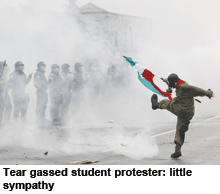Canada: Tuition fee protesters’ first victim
Quebec’s governing liberal party has lost its minister of education after more than three months of strikes by as many as 200,000 university and junior college students against a proposed 75 percent increase in tuition fees, while protesters have been arrested and tear-gassed.
 The resignation of Line Beauchamp caught the province’s leadership off guard. “I am resigning because I no longer believe I’m part of the solution,” she said in an emotional press conference. The provincial government has now introduced emergency legislation that could shut some universities in an attempt to end the protests. Just a few days earlier, it appeared Beauchamp had come to a compromise with the three student groups leading the strike.
The resignation of Line Beauchamp caught the province’s leadership off guard. “I am resigning because I no longer believe I’m part of the solution,” she said in an emotional press conference. The provincial government has now introduced emergency legislation that could shut some universities in an attempt to end the protests. Just a few days earlier, it appeared Beauchamp had come to a compromise with the three student groups leading the strike.
The plan would have meant fees rising from an average of around C$2,100 (Rs.1.13 lakh) to about C$3,800 over seven years, as opposed to the government’s original plan of four years. But students at the University of Quebec, the University of Montreal, Laval University and (most significantly) many of the province’s junior colleges voted against the compromise.
Canadians outside Quebec, whose tuition averages C$6,000 (Rs.3.24 lakh) a year, have little sympathy for the Quebecois’ complaints. According to Desmond Morton, director of the McGill Institute for the Study of Canada, the protesters have been influenced by traditional arguments in the province that Quebec higher education should be free like France’s, not like the US model “where universities can charge what the market will bear”.
Martine Desjardins, president of the Quebec Federation of University Students, believes higher fees will prevent the poor from accessing post-secondary education. But Michael Childs, vice principal of Bishop’s University, Quebec, disagrees. “The system now is socially regressive: it subsidises upper-middle class kids who are the predominant users of the system,” he says. “If you come from a poor family, you receive large bursaries. The government plan — to increase funding for student loans and then gear repayment to ability to pay — is much more progressive.”
The public is left wondering how the impasse will end, especially since emergency legislation announced recently to call a “timeout” on the strikes has sparked further intense protest.
(Excerpted and adapted from Times Higher Education)















Add comment